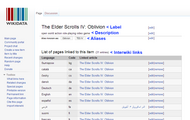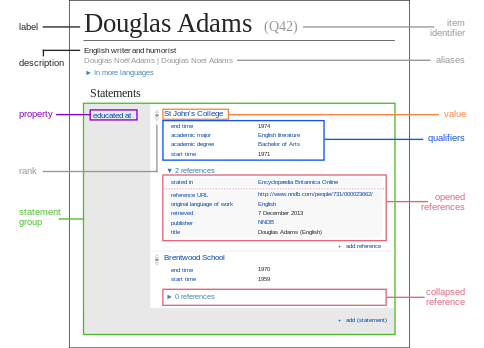Wikidata
 | |
 Main page of Wikidata | |
Type of site | |
|---|---|
| Available in | multiple languages, Wikidatan |
| Owner | Wikimedia Foundation, Inc.[1][2] |
| Created by | Wikidata editors |
| Website | www |
| Alexa rank | |
| Commercial | No |
| Registration | Optional |
| Launched | 29 October 2012[4] |
Wikidata is a collaboratively edited knowledge base hosted by the Wikimedia Foundation. It is a common source of open data that Wikimedia projects such as Wikipedia can use,[5][6] and by anyone else, under a public domain license. This is similar to the way Wikimedia Commons provides storage for media files and access to those files for all Wikimedia projects, and which are also freely available for reuse. Wikidata is powered by the software Wikibase.[7]
Contents
Concepts[edit]
Click here to visit the Wikidata entry for the article featured.
Wikidata is a document-oriented database, focused on items. Each item represents a topic (or an administrative page used to maintain Wikipedia) and is identified by a unique number, prefixed with the letter Q — for example, the item for the topic Douglas Adams is Q42 — known as a "QID". This enables the basic information required to identify the topic the item covers to be translated without favouring any language.
Items[edit]
An item can have one or more statements. Information is added to items by creating statements, in the form of key-value pairs, with each statement consisting of a property (the key) and a value linked to the property. Additionally, a qualifier can refine the meaning of the statement by providing additional information that applies to the scope of the statement. References can be provided per statement.
Properties[edit]
A property describes the data value of a statement and can be thought of as a category of data, for example "color" for the data value "blue." Properties, when paired with values, form a statement in Wikidata. Properties are also used in qualifiers. Properties have their own pages on Wikidata and are connected to items, resulting in a linked data structure, where the property represents a triplet's predicate. Property pages also contain constraints, which are rules about how a particular property should be used. For instance most identifiers should have only one value, so there is a single value constraint on them.[8]
Lexemes[edit]
In linguistics, a lexeme is a unit of lexical meaning. Similarly, Wikidata's lexemes are items with a structure that makes them more suitable to store lexicographical data. Besides of storing the language to which the lexeme refers, they have a section for forms and a section for senses.[9]
Development history[edit]
The creation of the project was funded by donations from the Allen Institute for Artificial Intelligence, the Gordon and Betty Moore Foundation, and Google, Inc., totaling €1.3 million.[10][11] The development of the project is mainly driven by Wikimedia Deutschland and was originally split into three phases:[12]
- Centralising interlanguage links – links between Wikipedia articles about the same topic in different languages
- Providing a central place for infobox data for all Wikipedias
- Creating and updating list articles based on data in Wikidata
Initial rollout[edit]
Wikidata was launched on 29 October 2012 and was the first new project of the Wikimedia Foundation since 2006.[5][13][14] At this time, only the centralization of language links was available. This enabled items to be created and filled with basic information: a label – a name or title, aliases – alternative terms for the label, a description, and links to articles about the topic in all the various language editions of Wikipedia.
Historically, a Wikipedia article would include a list of interlanguage links, being links to articles on the same topic in other editions of Wikipedia, if they existed. Initially, Wikidata was a self-contained repository of interlanguage links. Wikipedia language editions were still not able to access Wikidata, so they needed to continue to maintain their own lists of interlanguage links.
On 14 January 2013, the Hungarian Wikipedia became the first to enable the provision of interlanguage links via Wikidata.[15] This functionality was extended to the Hebrew and Italian Wikipedias on 30 January, to the English Wikipedia on 13 February and to all other Wikipedias on 6 March.[16][17][18][19] After no consensus was reached over a proposal to restrict the removal of language links from the English Wikipedia,[20] the power to delete them from the English Wikipedia was granted to automatic editors (bots). On 23 September 2013, interlanguage links went live on Wikimedia Commons.[21]
Statements and data access[edit]
On 4 February 2013 statements were introduced to Wikidata entries. The possible values for properties were initially limited to two data types (items and images on Wikimedia Commons), with more data types (such as coordinates and dates) to follow later. The first new type, string, was deployed on 6 March.[22]
The ability for the various language editions of Wikipedia to access data from Wikidata was rolled out progressively between 27 March and 25 April 2013.[23][24]
On 16 September 2015, Wikidata began allowing so-called arbitrary access, or access from a given Wikidata item to the properties of items not directly connected to it. For example, it became possible to read data about Germany from the Berlin article, which was not feasible before.[25] On 27 April 2016 arbitrary access was activated on Wikimedia Commons.[26]
Query service[edit]
On 7 September 2015, the Wikimedia Foundation announced the release of the Wikidata Query Service,[27] which lets users run queries on the data contained in Wikidata.[28] The service uses SPARQL as the query language. As of November 2018, there are at least 26 different tools that allow to query the data in different ways.[29]
Reception[edit]
In November 2014, Wikidata received the Open Data Publisher Award from the Open Data Institute “for sheer scale, and built-in openness”.[30]
As of November 2018, Wikidata information is used in 58.4% of all English Wikipedia articles, mostly for external identifiers or coordinate locations. In aggregate, data from Wikidata is shown in 64% of all Wikipedias' pages, 93% of all Wikivoyages, 34% of all Wikiquotes, 32% of all Wikisources, and 27% of Wikimedia Commons. Usage in other Wikimedia Foundation projects is testimonial.[31]
As of November 2018, Wikidata's data is visualized by at least 20 other external tools[32] and at least 100 papers have been published about Wikidata.[33] Its importance has been recognized by numerous cultural institutions.[34]
Logo[edit]
The bars on the logo contain the word "WIKI" encoded in Morse code.[35]
See also[edit]
References[edit]
- ^ https://www.wikidata.org/wiki/Wikidata:Introduction.
- ^ From Freebase to Wikidata: The Great Migration; quote: Another example is Wikidata, a collaborative knowledgebase developed by Wikimedia Deutschland since 2012 and operated by the Wikimedia Foundation..
- ^ "Wikidata.org Traffic, Demographics and Competitors - Alexa". www.alexa.com. Retrieved 4 February 2019.
- ^ https://www.wikidata.org/wiki/Wikidata:First_Birthday.
- ^ a b Wikidata (Archived October 30, 2012, at WebCite)
- ^ "Data Revolution for Wikipedia". Wikimedia Deutschland. March 30, 2012. Archived from the original on September 11, 2012. Retrieved September 11, 2012.
- ^ "Wikibase — Home".
- ^ "Wikidata help page about Properties".
- ^ "Wikidata - Lexicographical data documentation".
- ^ Dickinson, Boonsri (March 30, 2012). "Paul Allen Invests In A Massive Project To Make Wikipedia Better". Business Insider. Retrieved September 11, 2012.
- ^ Perez, Sarah (March 30, 2012). "Wikipedia's Next Big Thing: Wikidata, A Machine-Readable, User-Editable Database Funded By Google, Paul Allen And Others". TechCrunch. Archived from the original on September 11, 2012. Retrieved September 11, 2012.
- ^ "Wikidata - Meta".
- ^ Pintscher, Lydia (October 30, 2012). "wikidata.org is live (with some caveats)". wikidata-l (Mailing list). Retrieved November 3, 2012.
- ^ Roth, Matthew (March 30, 2012). "The Wikipedia data revolution". Wikimedia Foundation. Archived from the original on September 11, 2012. Retrieved September 11, 2012.
- ^ Pintscher, Lydia (14 January 2013). "First steps of Wikidata in the Hungarian Wikipedia". Wikimedia Deutschland. Retrieved 17 December 2015.
- ^ Pintscher, Lydia. "Wikidata coming to the next two Wikipedias". Wikimedia Deutschland. Retrieved January 31, 2013.
- ^ Pintscher, Lydia (13 February 2013). "Wikidata live on the English Wikipedia". Wikimedia Deutschland. Retrieved 15 February 2013.
- ^ Pintscher, Lydia (6 March 2013). "Wikidata now live on all Wikipedias". Wikimedia Deutschland. Retrieved 8 March 2013.
- ^ "Wikidata ist für alle Wikipedien da" (in German). Golem.de. Retrieved 29 January 2014.
- ^ "Wikipedia talk:Wikidata interwiki RFC". March 29, 2013. Retrieved March 30, 2013.
- ^ Pintscher, Lydia (23 September 2013). "Wikidata is Here!". Commons:Village pump.
- ^ Pintscher, Lydia. "Wikidata/Status updates/2013 03 01". Wikimedia Meta-Wiki. Wikimedia Foundation. Retrieved 3 March 2013.
- ^ Pintscher, Lydia (27 March 2013). "You can have all the data!". Wikimedia Deutschland. Retrieved 28 March 2013.
- ^ "Wikidata goes live worldwide". The H. 2013-04-25. Archived from the original on 3 January 2014.
- ^ Lydia, Pintscher (16 September 2015). "Wikidata: Access to data from arbitrary items is here". Wikipedia:Village pump (technical). Retrieved 30 August 2016.
- ^ Lydia, Pintscher (27 April 2016). "Wikidata support: arbitrary access is here". Commons:Village pump. Retrieved 30 August 2016.
- ^ https://query.wikidata.org/
- ^ "Announcing the release of the Wikidata Query Service".
- ^ "Wikidata Query Data tools".
- ^ "First ODI Open Data Awards presented by Sirs Tim Berners-Lee and Nigel Shadbolt".
- ^ "Percentage of articles making use of data from Wikidata".
- ^ "Wikidata Tools - Visualize data".
- ^ "Scholia - Wikidata".
- ^ "International Semantic Web Conference 2018".
- ^ commons:File talk:Wikidata-logo-en.svg#Hybrid. Retrieved 2016-10-06.
Further reading[edit]
- Mark Graham (6 April 2012), "The Problem With Wikidata", The Atlantic, US
- Denny Vrandečić, Markus Krötzsch: Wikidata: A Free Collaborative Knowledge Base. Communications of the ACM. ACM. 2014 (preprint).
- Claudia Müller-Birn, Benjamin Karran, Janette Lehmann, Markus Luczak-Rösch: Peer-production system or collaborative ontology development effort: What is Wikidata? In, OpenSym 2015 - Conference on Open Collaboration, San Francisco, US, 19 - 21 Aug 2015 (preprint).
External links[edit]
![]() Media related to Wikidata at Wikimedia Commons
Media related to Wikidata at Wikimedia Commons
- Official website
 (Mobile)
(Mobile) - Videos: WikidataCon on media.ccc.de





